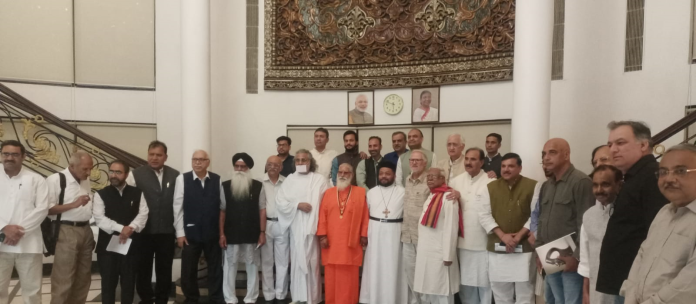New Delhi: The Indian Muslims for Civil Rights (IMCR) and India Islamic Cultural Centre (IICC) hosted an interfaith dialogue titled “Common Values of Different Religions for the Promotion of Human Rights.” The event, held on Thursday evening, brought together a diverse group of civil society leaders, interfaith representatives, members of parliament, retired judges, policymakers, former bureaucrats, retired military officers, and well-known human rights activists at IICC here. The goal is to address current challenges facing various communities and the nation.
Mohammed Adeeb, IMCR Chairman and former MP, opened the session by reflecting on the current climate in India.
He remarked, “We once believed that the Babri Masjid incident would be the last assault on the Muslim community. However, the ongoing targeting of Muslims indicates that it was only the beginning of the challenges we face today.”
He emphasised the importance of interfaith dialogue in schools, colleges, and universities to promote tolerance, respect for humanity, and he preservation of India’s core value of unity in diversity. He added, “It’s not only Muslims feeling unsafe; many non-Muslims also share this sense of vulnerability, and minorities must stand together.”
Najeeb Jung, former Lieutenant Governor of Delhi, commented on the government’s approach over the past decade, stating, “The current administration has attempted to portray Muslim and Christian religions as inferior. Through laws like the UCC, CAA, NRC, and the recent Waqf Bill, there has been a consistent effort to dictate the direction for minorities.”
He highlighted the community’s awakening during the protests against the CAA and NRC, underscoring their readiness to fight for their rights.
S.Y. Quraishi, former Chief Election Commissioner, called for greater unity among people of all religions, irrespective of individual grievances, for broader benefit of the community and the nation. He pointed to recent divisive rhetoric and stressed the need for collective efforts to foster harmony.
Salman Khurshid, former Union Minister and President of IICC, spoke about the collective realisation of the challenges faced today.
He remarked, “Despite swearing an oath to the Constitution, many leaders fail to uphold its principles in practice. Our dialogue must include discussions on constitutional values and practical equality at the grassroots level to achieve true justice.”
Goswami Sushilji Maharaj, National Convener of Bharatiya Sarva Dharma Sansad, underscored the significance of protecting the Constitution, asserting that it would safeguard the rights of all communities. He called for expanding interfaith dialogue to counter contemporary challenges effectively.
Justice Iqbal Ansari, former Chief Justice of Patna High Court, emphasised the importance of unity among religions based on shared values. He noted that the Constitution’s commitment to equality and unity is fundamental to its survival.
Dr. MD Thomas, founder of Institute of Harmony and Peace Studies, countered divisive slogans with a message of unity: “If we unite, we will win.”
Fuzail Ayyubi, a Senior Supreme Court lawyer, highlighted the alignment of constitutional morality with the positive teachings of all religions, stressing the need to uphold and preserve the Constitution.
Sardar Dayal Singh, representing the Sikh community, recalled the objections of Sikh leaders during the adoption of the Constitution. He stated, “As long as Sikhs and Muslims are part of this nation, India cannot transform into a ‘Hindu Rashtra.’“
The gathering concluded with a call to establish an Interfaith University in Delhi, aimed at fostering a deeper understanding of shared values among different religions and promoting the spirit of the Indian Constitution. The proposed university would serve as a platform to preserve and protect the ethos of unity in diversity, which is the foundation of the Indian nation.




